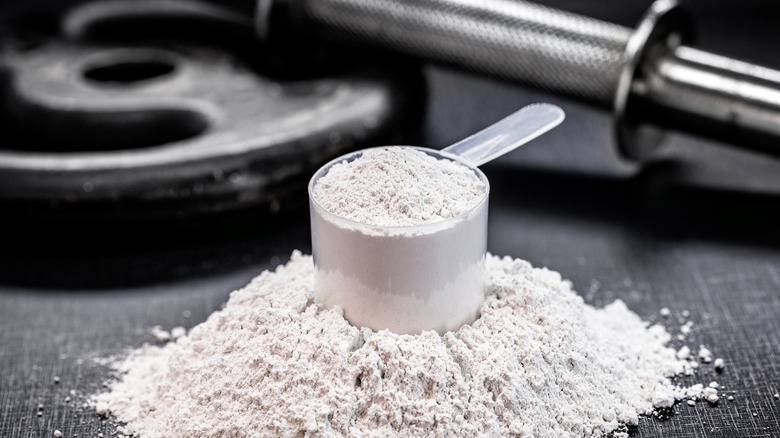How Much Protein GNC's Whey Protein Powder Really Has
Scanning through the many offerings of protein powder available on the shelves (or online) can become dizzying. More and more brands saturate the protein powder market with their stylized graphics and dessert-type flavors. Some will add caffeine, others will add creatine, and still others have tons of "superfoods" that make you believe you'll get super strength with just one sip. But really, you're just looking for a good, no-nonsense protein powder.
As a whole, you really don't need to supplement your diet with whey protein, especially if you're a male adult who eats meat, according to Mayo Clinic. You might think that drinking a 50-gram protein shake after your workout might help you build muscle and recover from your workout. Yet anything more than 30 grams of protein in any meal isn't going to be more beneficial. Instead, it's best to space out your protein throughout the day so your body is getting a steady stream of it. Remember, if your body isn't using protein for muscle synthesis, it will store it as energy ... or fat. If you look at most of GNC's offerings of whey protein powder, you'll notice that most of them will give you between 20 to 25 grams of protein per scoop.
What's in GNC's whey protein shakes
GNC has several options for protein shakes available on its website. You'll see that the 100% Whey Marvel line gives you 24 grams of whey protein per 140-calorie serving. This powder also has 2.5 grams of fat (1.5 grams of saturated fat) and 5 grams of carbs. Whey protein concentrate goes through less processing than whey protein isolate, so that's why you'll find some carbs and fat (via Healthline).
One scoop of GNC's Wheybolic Ripped Vanilla gives you 20 grams of whey protein isolate, so you'll eliminate the fat and get just 3 grams of carbs in a scoop. However, the serving size is two scoops rather than one. Therefore, even if you see 40 grams of protein on the front label, you'll have to remember to put two scoops in your shake. Remember that your body probably doesn't need more than 30 grams at a time. Yet a 2018 article in the Journal of the International Society of Sports Nutrition says that if your goal is to build muscle, your protein intake could depend on your body weight. It suggests taking in 0.4 grams of protein per kilogram of body weight per meal. In other words, people needing 40 grams of protein in a protein shake will weigh 100 kilograms, or 220 pounds.
Adding casein protein to your whey protein shakes
One option you'll find among GNC's selection of whey protein powders is protein blends, such as the Sustained Protein Blend. Even though you'll still get 25 grams of protein per serving, your body will digest some of these proteins faster than others. Whey protein tends to be the go-to option for a post-workout supplement because it's digested much more quickly. On the other hand, casein protein takes a little longer to digest, so your body will be continuing its process of creating and synthesizing proteins up to three or four hours later (via WebMD). This is why casein protein is often called a "time-released" protein. Unfortunately, GNC doesn't give a breakdown of how much whey and casein you get in each scoop.
Even so, you might find that having a whey and casein protein combo might be a better choice if you want to make changes to your body, according to a 2006 study in the Journal of Strength and Conditioning Research. Male weight lifters who consumed whey and casein protein gained more fat-free muscle mass than those who consumed a whey protein, branched-chain amino acids, and glutamine supplement.



